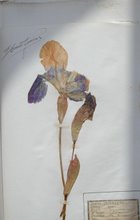Más ejemplos y al final una regla disparatada en el décimo octavo párrafo de El Origen de las Especies
 Una curiosa y disparatada manera de razonar, bien opuesta al método científico , se pone de manifiesto en esta sentencia:
Una curiosa y disparatada manera de razonar, bien opuesta al método científico , se pone de manifiesto en esta sentencia:
If strange and rare deviations of structure are truly inherited, less strange and commoner deviations may be freely admitted to be inheritable.
Es decir que si se hereda lo extraño, por eso debemos admitir libremente que se herede lo más común. ¿Por qué? Nos quedamos sin respuesta,......
Sigue una sentencia inacabada que siembra algunas dudas más:
doubts have been thrown on this principle only by theoretical writers
Y bien: ¿Quiénes son esos theoretical writers?
Al final, el párrafo termina en una sentencia ciertamente arriesgada, un disparate:
Perhaps the correct way of viewing the whole subject would be, to look at the inheritance of every character whatever as the rule, and non-inheritance as the anomaly.
Quizá el modo justo de ver todo este asunto sería considerar la herencia de todo carácter, cualquiera que sea, como regla, y la no herencia, como excepción.
Toda variación que no es hereditaria carece de importancia para nosotros. Pero es infinito el número y diversidad de variaciones de estructura hereditarias, tanto de pequeña como de considerable importancia fisiológica. El tratado, en dos grandes volúmenes, del doctor Prosper Lucas es el más completo y el mejor sobre este asunto. Ningún criador duda de lo enérgica que es la tendencia a la herencia; que lo semejante produce lo semejante es su creencia fundamental; solamente autores teóricos han suscitado dudas sobre este principio. Cuando una anomalía cualquiera de estructura aparece con frecuencia y la vemos en el padre y en el hijo, no podemos afirmar que esta desviación no pueda ser debida a una misma causa que haya actuado sobre ambos; pero cuando entre individuos evidentemente sometidos a las mismas condiciones alguna rarísima anomalía, debida a alguna extraordinaria combinación de circunstancias, aparece en el padre -por ejemplo: una vez entre varios millones de individuos- y reaparece en el hijo, la simple doctrina de las probabilidades casi nos obliga a atribuir a la herencia su reaparición. Todo el mundo tiene que haber oído hablar de casos de albinismo, de piel con púas, de cuerpo cubierto de pelo, etc., que aparecen en varios miembros de la misma familia. Si las variaciones de estructura raras y extrañas se heredan realmente, puede admitirse sin reserva que las variaciones más comunes y menos extrañas son heredables. Quizá el modo justo de ver todo este asunto sería considerar la herencia de todo carácter, cualquiera que sea, como regla, y la no herencia, como excepción.














































No hay comentarios:
Publicar un comentario